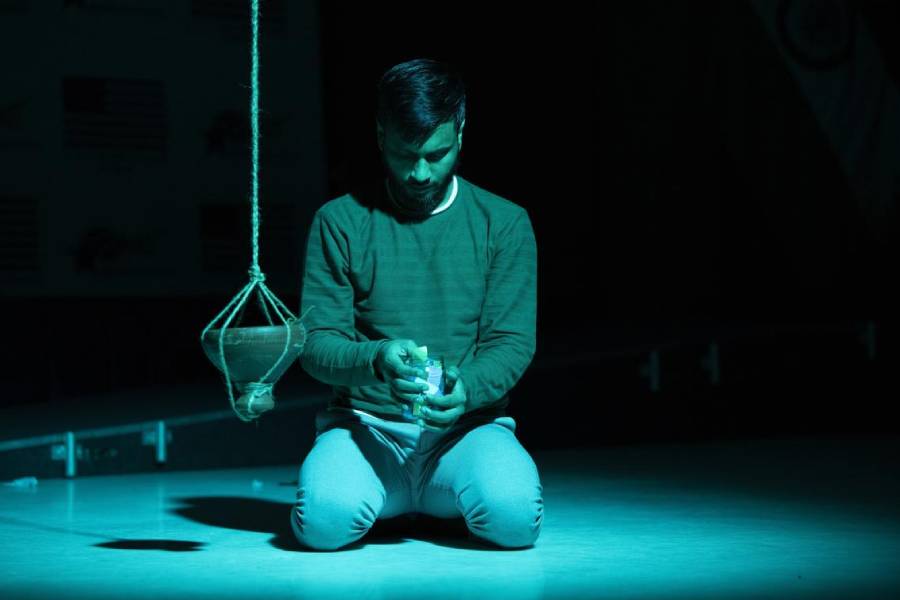An exciting 80-minute romp, Indian Mime Theatre’s Lokkatha, recently staged at the beautiful space at the National Mime Institute, unleashed a collective energy and made deep and intimate connections wordlessly with the audience. It teased the imagination playfully and ingeniously, working with meticulously thought-up details in a folk tale from Chhattisgarh that was transformed into an exciting sensory adventure.
Suroj Biswas’s extraordinary directorial work, a full-length, gripping non-verbal play based on a tale about blind avarice leading, inevitably, to destruction, is audaciously creative. With brilliant stagecraft, superb physical acting and dynamic representation of a simple story, it is an experiment with multiple forms such as trapeze, gymnastics, dance, mime, physical theatre of the kind inspired by Jerzy Grotowski, and glimpses of martial arts. The parable, which has a moral at the end, is told powerfully in an atmosphere thick with engaging music. It played with dazzling light as well as dizzying darkness, an enchanting replica of the moon casting a sinister spell in the forest scenes. In spite of an emotional build-up, the climax of the play arrives as a shock. The rough and tumble of the denouement throbs with the bone-chilling realisation that one has to pay heavily for excessive greed. The costumes and props are vivid and symbolic, turning the course of the story and drawing up its dreadful end.

A moment from Shifting Syllables Sourced by The Telegraph
Tender, charming, funny and persuasive, the play is an effective exploration of the medium of non-verbal theatre. Although immersive and eloquent throughout, the piece has some stand-out moments. The fierce battle with the malevolent creature of the jungle and the young newly-weds trying to make friends with each other on the night of their wedding will linger in the mind, the former pulsating with ferocity and sparkling visual magic and the latter for its delightfully light touch.
In an engaging and thoughtful show at the American Centre recently, Amitabh Srivastava performed a piece based on three poems by American poets of Asian origin. Presented by Pickle Factory, Shifting Syllables was about the significance that names carry, and how they define identities. The three poems — “On Listening to Your Teacher Take Attendance” by Aimee Nezhukumatathil, “Names” by Teresa Mei Chuc, and “Cardamom Vowels” by Aruni Wijesinghe — dealt with the many-layered construct of names, their politics and baggages. Since the three poets differ widely in the way they process the repercussions of their ‘outlandish’ names in their adopted country, Srivastava attempted to embody their struggles from their varying perspectives. The name is the pivot on which social status must rest, becoming the grounds for privileges or oppression for its owner. Into this mix of diasporic sensibilities, Srivastava threw in the complexities of his own identity as a privileged North Indian male to show up yet another mirror to society.
The choreographer, Shila Mehta, used charani ballad singing as the music for her piece, Nimitta, which she presented at Kalamandir recently. Within the traditional framework of Kathak, the work speaks of the inevitable cosmic design in stories such as that of Shikhandi who was born a woman and, later, transformed into a man to become the cause of Bhishma’s defeat in the Mahabharata, thus turning a prophecy on its head. The piece touches upon questions of gender bias and also attempts to bring forth a conversation about the third gender.










